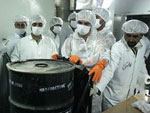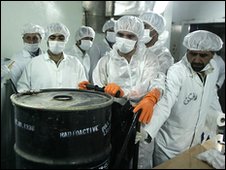 Wall Street Journal: As the U.S. and Iran prepare for Monday’s first diplomatic meeting between the two sides in more than a year, Tehran announced delivery of its first shipment of homemade “yellowcake” uranium—a troubling sign for Western governments seeking to contain the nation’s nuclear ambitions.
Wall Street Journal: As the U.S. and Iran prepare for Monday’s first diplomatic meeting between the two sides in more than a year, Tehran announced delivery of its first shipment of homemade “yellowcake” uranium—a troubling sign for Western governments seeking to contain the nation’s nuclear ambitions.
The Wall Street Journal
By JAY SOLOMON
 GENEVA—As the U.S. and Iran prepare for Monday’s first diplomatic meeting between the two sides in more than a year, Tehran announced delivery of its first shipment of homemade “yellowcake” uranium—a troubling sign for Western governments seeking to contain the nation’s nuclear ambitions.
GENEVA—As the U.S. and Iran prepare for Monday’s first diplomatic meeting between the two sides in more than a year, Tehran announced delivery of its first shipment of homemade “yellowcake” uranium—a troubling sign for Western governments seeking to contain the nation’s nuclear ambitions.
At the same time, significant differences have emerged over such basics as the terms and substance of the discussions on Tehran’s nuclear program set for Monday and Tuesday in Geneva.
Iran on Sunday announced it had delivered yellowcake, made from uranium ore from its Gachin mine near the Persian Gulf, to a fuel-conversion facility in the city of Isfahan. Yellowcake, a concentrated form of uranium, is the key feedstock needed to produce either fuel for a nuclear reactor, or the highly enriched uranium for atomic weapons. Iran’s successful development of the capacity to make its own yellowcake would make Tehran’s nuclear program less susceptible to outside pressure.
The quality of the yellowcake in the delivery isn’t known. Nuclear experts believe that Iran’s uranium deposits are too small and low-grade to sustain a nuclear power program, though it is already believed to have enough low-enriched uranium to produce atomic weapons.
Ali Akbar Salehi, head of Iran’s Atomic Energy Organization, said the delivery, marking the first time domestically produced yellowcake would be used at a key nuclear plant, represented a major step forward in its program. “This means that Iran has become self-sufficient in the entire fuel cycle,” he told Iranian state television Sunday in Tehran.
“No matter how much effort they put into their sanctions…our nuclear activities will proceed and they will witness greater achievements in the future,” Mr. Salehi said, adding that Iran’s nuclear advances are only for peaceful purposes.
The announcement on the eve of talks echoed defiant tones struck by other Iranian officials over the weekend, who stressed at forums in the Persian Gulf and Europe that Tehran has a non-negotiable right to produce nuclear fuel. For that reason, they said, the discussions in Geneva should focus on more general issues, such as the structure of the global non-proliferation system and the status of Israel’s presumed nuclear-weapons program.
Senior Obama administration officials countered that any progress in the Geneva negotiations could occur only if Iran addresses the concerns about its nuclear-fuel production—in particular, its moves to enrich uranium to levels closer to weapons grade. They also said Tehran’s announcement of the yellowcake shipment to the conversion facility only deepens the fears internationally that Iran’s goal is to build nuclear weapons.
“Given that Iran’s own supply of uranium is not enough for a peaceful nuclear energy program, this calls into further question Iran’s intentions,” said Mike Hammer, the spokesman for the White House’s National Security Council. “The purpose of the…talks here in Geneva tomorrow is to underscore the concern of the entire international community in Iran’s actions.”
Iran last month agreed to a meeting after a year of back and forth.
Mr. Hammer said the U.S. wasn’t surprised by Mr. Salehi’s announcement of the yellowcake delivery to Isfahan. But U.S. and United Nations officials have said in recent months that Iran’s relatively small supplies of natural uranium ore, which is ground into yellowcake, are inadequate to fuel the expansive nuclear-power program Tehran says it is developing. However, this supply—along with the yellowcake Iran imported from South Africa in the 1970s—is enough for a small nuclear-weapons arsenal, according to these officials.
Leading the talks for the U.S. and the four other permanent members of the United Nations Security Council—Russia, China, France and the U.K.—plus Germany, is Catherine Ashton, the European Union’s foreign-policy chief. The Iranian side will be headed by Tehran’s chief nuclear negotiator, Saeed Jalili. The State Department’s No. 3 diplomat, William Burns, is representing the Obama administration.
Monday’s meeting will mark the first time Tehran has sat down with these international powers since October 2009. At that time, the Iranian government initially agreed to a key confidence-building measure that would have seen Tehran ship two-thirds of its uranium stockpile to third countries in exchange for energy and medical assistance.
The U.S. liked that proposal because it would have denied Iran enough fissile material to build an atomic weapon. But Tehran backed away from the deal amid political infighting between President Mahmoud Ahmadinejad and other Iranian political factions.
U.S. officials have said in recent weeks that they would like to re-examine the fuel-swap proposal with Tehran. But they said that Iran would need to ship out significantly more of its low-enriched uranium stockpile to address the fears it might move rapidly to assemble a nuclear bomb. During last year’s negotiations, Iran had 1,600 kilograms of low-enriched uranium, according to the U.N; today its supply stands at more than 3,000 kilograms.
It’s estimated that Iran would need around 600 kilograms of low-enriched uranium to make a bomb if it decided to enrich the material further into weapons grade.
Iran has given conflicting signals in recent months about its willingness to accept the nuclear fuel-swap proposal. Some Iranian officials have said Iran would be open to buying more higher enriched uranium from the international market to produce medical isotopes, provided the fuel supply is guaranteed. But they have stressed U.S. and European suppliers are unreliable.
Senior American and Iranian officials have squared off over the nuclear issue in a number of different venues in recent days.
Secretary of State Hillary Clinton and her Iranian counterpart, Manouchehr Mottaki, gave competing speeches at a regional security conference in the Persian Gulf sheikhdom of Bahrain on Friday. Mrs. Clinton stressed the U.S.’s desire for better relations, but said that could come only after Tehran addressed the concerns over its nuclear activities. Mr. Mottaki responded in his speech that President Barack Obama’s policy towards Iran has proven no different than George W. Bush’s.
Mrs. Clinton told reporters that she’d attempted to greet Mr. Mottaki following a dinner Friday in Bahrain but that “he just turned away.” Iran’s foreign minister responded in a Saturday press conference that he had acknowledged Washington’s chief diplomat, but had to quickly turn to greet Jordan’s King Abdullah.
Iran has in recent days intensified its attacks on the U.N.’s nuclear watchdog, the International Atomic Energy Agency.
Mr. Jalili, the nuclear negotiator, and Heidar Moslehi, the head of Iran’s intelligence ministry, both this weekend charged the IAEA with colluding with Western spy agencies to provide information on Tehran’s nuclear work. They also said the U.N. body provided information to the West on two Iranian nuclear scientists who were attacked last Monday in nearly simultaneous car bombings, one of whom died.
“Among the individuals the IAEA sends as so-called inspectors, there are spies from foreign intelligence services. The IAEA must be held responsible for this,” Mr. Moslehi, told state television.
U.S. and U.N. officials fear Iran’s attacks on the IAEA could presage Tehran limiting even further the agency’s activities inside Iran. Earlier this year, Tehran kicked out two IAEA inspectors alleging that they provided false information on the state of Iran’s nuclear work. Iran has also denied the inspectors access to a heavy-water reactor complex, and it has refused to answer the IAEA’s questions about Tehran’s alleged efforts to develop military applications for its nuclear program.
IAEA officials have declined to comment on Iran’s spying charges. The U.S. has denied any role in the attack on the two Iranian nuclear scientists.


